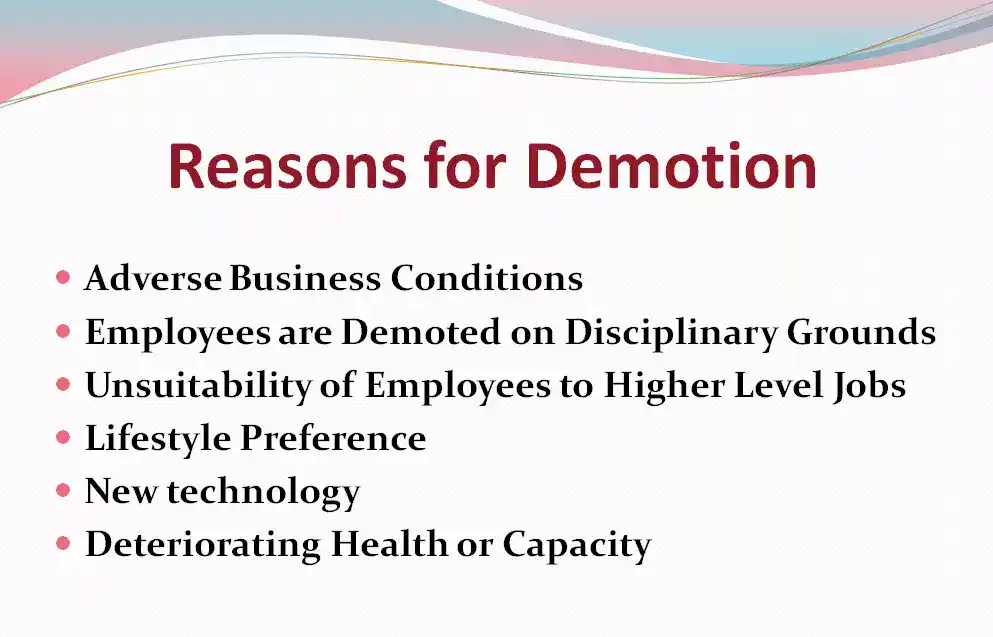Table of Contents:-
- Meaning of Demotion
- Definition of Demotion
- Features of Sound Demotion Policy
- Reasons for Demotion
- Problems Caused by Demotion
- Ways to Cope with Demotion
- Difference between Promotion and Demotion
Meaning of Demotion
Demotion is an employee’s job assignment to a lower rank with lower pay. It is just the opposite of promotion and thus involves the downward career movement of the employee in the organisational structure. Demotions may be necessary in the following situations:
1) It may be necessary to use demotion as a tool of disciplinary action against erring employees.
2) When the company curtails the scene of its activities, officers occupying certain posts are demoted.
3) Errors in the promotions already given are corrected through demotions.
Definition of Demotion
According to Beach, “Demotion is a reassignment of an individual to a job of lower rank and pay usually involving lower level of difficulty and responsibility”.
According to Dale Yoder, “Demotion may be defined as a shift to a position in which responsibilities are decreased. Promotion is an increase in rank and demotion is a decrease in rank”.
Demoting an employee is not an easy matter and calls for diplomacy and tact. Perhaps dismissing is easier than demoting. In both cases, the person’s interests and pride will be hurt, but in the latter case, since the person continues his association with the organisation, he may avenge by hurting the interests of the organisation.
Features of Sound Demotion Policy
A systematic policy on demotion should include the following points:
1) The superior who is authorised and responsible for initiating a promotion should be named.
2) Once violations are proved, there should be consistent and equitable application of the policy.
3) The circumstances under which employees can be demoted (reduction in operations, serious indiscipline, etc.) should be specified and made known to employees.
4) The lines of demarcation (from one job to another) should be specified.
5) Any alleged violation of established rules and regulations should be competently investigated.
6) Clear-cut norms for judging merit and seniority should be stated.
7) The policy should be impartial and fair.
8) A provision should be made for appeal and review of every demotion.
9) In case of demotions caused by adverse economic conditions and technological changes, the basis for demotion (merit or seniority) should be specified.
10) It should be an open rather than a closed policy.
11) Guidelines for determining the seniority of demoted employees and the nature of demotion (permanent or temporary) should be formulated.
Reasons for Demotion
Various reasons for demotion are as follows:

1) Adverse Business Conditions
Generally, adverse business conditions force the organisation to reduce the quality of production, withdraw some lines of products, and close certain departments or plants. In addition, organisations resort to economic drives. Consequently, organisations minimise the number of employees. Junior employees will be retrenched while senior employees will face demotion under such conditions.
2) Employees are Demoted on Disciplinary Grounds
This is one of the extreme steps, so organisations rarely use this measure.
3) Unsuitability of Employees to Higher Level Jobs
Employees are promoted based on past performance and seniority. However, some of the employees promoted on those bases may not meet the job requirements of the higher-level job. In most cases, employees are promoted to a level that surpasses their competence. Some employees selected for higher-level jobs may prove to be incompetent in performing those jobs. Such employees may be demoted to lower-level positions where their skill, knowledge, and aptitude are better suited to the job requirements.
4) Lifestyle Preference
The employee prefers a less demanding and less time-consuming job to devote more time to outside work activities such as family or career commitments, study, or community/voluntary work. Again, it may be either a temporary or permanent option. It is quite popular among employees who wish to phase into their retirement.
5) New technology and updated methods of operation require advanced and updated skills.
If the existing employees do not develop themselves to meet those new requirements, organisations demote them to lower-level positions where they are much more suitable. For example, teachers handling the 10th class were demoted to the level of 8th class teachers when the syllabus was revised and the teachers were found misfit even after training in one school in Andhra Pradesh.
6) Deteriorating Health or Capacity
This change can be either a permanent or temporary (awaiting recovery) demotion, where the employee takes on a role that is physically or mentally less demanding.
Problems Caused by Demotion
Apart from the legal issues that may arise, there are several potential problems that demotion can cause if it is not handled appropriately.
1) It may not fix whatever the previous problem was. One needs to identify the underlying causes that led to the decision to demote. If poor performance was due to skills/knowledge shortcomings that training could not fix, a lower-level job may be okay, but if the cause is something else, the problems may still exist despite the new job.
2) If the employee’s new position is lower paid, it may adversely affect his/her financial position and security.
3) The new job may not suit the employee, creating a round peg in a square hole situation. Sometimes, expedient decisions are made, and the employee is demoted to a job that is available but may not be suitable.
4) If the Organisational Culture is highly status-driven, demotions are likely to be harder for employees to cope with than if the culture supports learning and new experiences.
5) Demotion not only affects the morale of the demoted employee but also the morale of co-workers (‘Who is next?”). The reasons for a demotion must be clear to both the employee being affected and their co-workers.
Ways to Cope with Demotion
1) On the Part of the Organisation
There are several ways an organisation can make demotion less traumatic for the employee:
Ways to cope with demotion are as follows:
i) Zig-Zag Mobility
Another way an organisation can ease the adjustment to a demotion is by fostering zig-zag mobility so that demoted employees can later be promoted if their job performance warrants it. In the absence of any potential for future growth, demotions will severely demotivate upwardly mobile employees. Zig-zag mobility holds open the possibility of future promotions after a demotion, making it a viable human resource strategy for organisations that use demotions.
ii) Cloaking
One method is by cloaking the demotion. For example, geographic relocation can make a demotion more acceptable by providing the individual with a new set of co-workers. Similarly, the use of special job or training assignments can cloak a demotion.
Besides the above two methods, organisations can make downward moves less traumatic by the following:
i) Avoid reducing salary.
ii) Select a job that demands that new skills be learned that broaden the employees’ skill base and increase their flexibility.
iii) Encourage input from the employee about the new job.
iv) Counsel the employee about future options, possibly through life and career planning workshops.
v) Place the employee in a new physical and social setting.
2) On the Part of the Individual
Individuals can make demotion less traumatic in the following ways:
i) Do not Despair
It is time to get courage and move on with duty performance. Despair can bring about aggravated negative effects. Despairing is accepting failure, which may be more destructive than the demotion itself. When one despairs, the family, personal work, business, career,r and other aspirations are adversely affected. One may fail in achieving any of these aims. It is therefore imperative to have composure, courage, and the determination to move ahead with life, facing it head-on.
ii) Accept Demotion
Individuals should accept demotion. This usually ensures that there are no ill feelings and the subsequent consequences, such as stress and depression. One has to have positive thinking toward the demotion. It must be seen as a benchmark for building weaknesses into strengths. Workers must learn to build strengths from their weaknesses. What does this imply? This simply means that, when workers are in trouble, they must learn to translate the problem into good results.
Therefore, when a problem occurs, they must see that as another opportunity to achieve another desired result. Without being confronted with problems, workers would not improve on their performance. Problems make employees work harder and utilise their skills, talents, knowledge, know-how, time, effort, and willpower to solve the problems, and the result is a more desirable achievement.
iii) Inform Friends and Family Members
This is a brilliant idea and it ensures that the worker gets support and comfort from the family members and friends. It also provides the worker with advice from these people and it can significantly help in going through those hard times.
iv) Learn to Cope with it
The worker should cope with the demotion so that it does not affect one’s duty performance or well-being. This implies that the staff should continue with work duties as prescribed and avoid any circumstances that may induce stress or mental unrest, such as family issues and work-related conflicts of interest. Although difficult, one must take it easy and move along with their normal work duties. One must exercise a lot of mental rest, such as having some private quiet sessions after work. It must be appreciated that leaving home straight after work would mean that the worker is confronted with other family complications that may worsen the situation.
Difference between Promotion and Demotion
Some of the differences are as follows:
1) Demotion has a much stronger (and negative) effect on compensation growth than promotion.
2) Promotions are slightly more frequent than demotions.
3) Demotion is a decrease in rank while promotion is an increase in rank.
4) The effect of promotion is smaller in magnitude than the effect of a demotion.
FAQ
1. What is the role of demotion in HRM?
The role of demotion in HRM is to maintain work-life balance, address performance issues, restructure and downsize employees, and act as a disciplinary action for misconduct.
2. What is demotion?
Demotion is the process of reducing an employee’s rank, position, or status within an organization due to poor performance, misconduct, organizational restructuring, skill mismatches, or the employee’s request. This generally involves a reduction of employees’ responsibilities, salary, or both, which reflects the lower level of responsibility and authority associated with the new position.
You May Also Like:
Human Resource Information System
